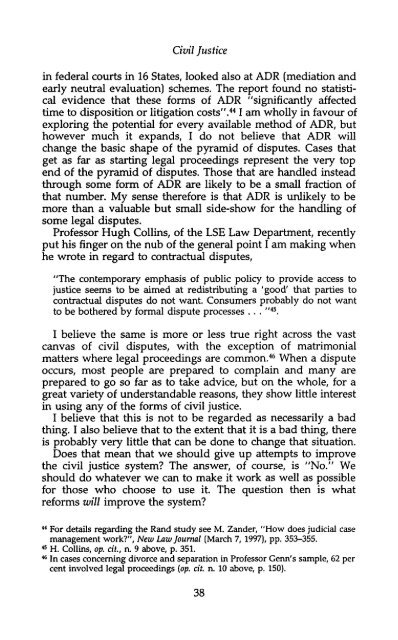HAMLYN - College of Social Sciences and International Studies ...
HAMLYN - College of Social Sciences and International Studies ...
HAMLYN - College of Social Sciences and International Studies ...
You also want an ePaper? Increase the reach of your titles
YUMPU automatically turns print PDFs into web optimized ePapers that Google loves.
Civil Justice<br />
in federal courts in 16 States, looked also at ADR (mediation <strong>and</strong><br />
early neutral evaluation) schemes. The report found no statistical<br />
evidence that these forms <strong>of</strong> ADR "significantly affected<br />
time to disposition or litigation costs". 44 1 am wholly in favour <strong>of</strong><br />
exploring the potential for every available method <strong>of</strong> ADR, but<br />
however much it exp<strong>and</strong>s, I do not believe that ADR will<br />
change the basic shape <strong>of</strong> the pyramid <strong>of</strong> disputes. Cases that<br />
get as far as starting legal proceedings represent the very top<br />
end <strong>of</strong> the pyramid <strong>of</strong> disputes. Those that are h<strong>and</strong>led instead<br />
through some form <strong>of</strong> ADR are likely to be a small fraction <strong>of</strong><br />
that number. My sense therefore is that ADR is unlikely to be<br />
more than a valuable but small side-show for the h<strong>and</strong>ling <strong>of</strong><br />
some legal disputes.<br />
Pr<strong>of</strong>essor Hugh Collins, <strong>of</strong> the LSE Law Department, recently<br />
put his finger on the nub <strong>of</strong> the general point I am making when<br />
he wrote in regard to contractual disputes,<br />
"The contemporary emphasis <strong>of</strong> public policy to provide access to<br />
justice seems to be aimed at redistributing a 'good' that parties to<br />
contractual disputes do not want. Consumers probably do not want<br />
to be bothered by formal dispute processes . . . " 45 .<br />
I believe the same is more or less true right across the vast<br />
canvas <strong>of</strong> civil disputes, with the exception <strong>of</strong> matrimonial<br />
matters where legal proceedings are common. 46 When a dispute<br />
occurs, most people are prepared to complain <strong>and</strong> many are<br />
prepared to go so far as to take advice, but on the whole, for a<br />
great variety <strong>of</strong> underst<strong>and</strong>able reasons, they show little interest<br />
in using any <strong>of</strong> the forms <strong>of</strong> civil justice.<br />
I believe that this is not to be regarded as necessarily a bad<br />
thing. I also believe that to the extent that it is a bad thing, there<br />
is probably very little that can be done to change that situation.<br />
Does that mean that we should give up attempts to improve<br />
the civil justice system? The answer, <strong>of</strong> course, is "No." We<br />
should do whatever we can to make it work as well as possible<br />
for those who choose to use it. The question then is what<br />
reforms will improve the system?<br />
44 For details regarding the R<strong>and</strong> study see M. Z<strong>and</strong>er, "How does judicial case<br />
management work?", New Law Journal (March 7, 1997), pp. 353-355.<br />
45 H. Collins, op. tit, n. 9 above, p. 351.<br />
46 In cases concerning divorce <strong>and</strong> separation in Pr<strong>of</strong>essor Genn's sample, 62 per<br />
cent involved legal proceedings [op. cit. n. 10 above, p. 150).<br />
38

















